Catherine McKenney is trying not to think about making history
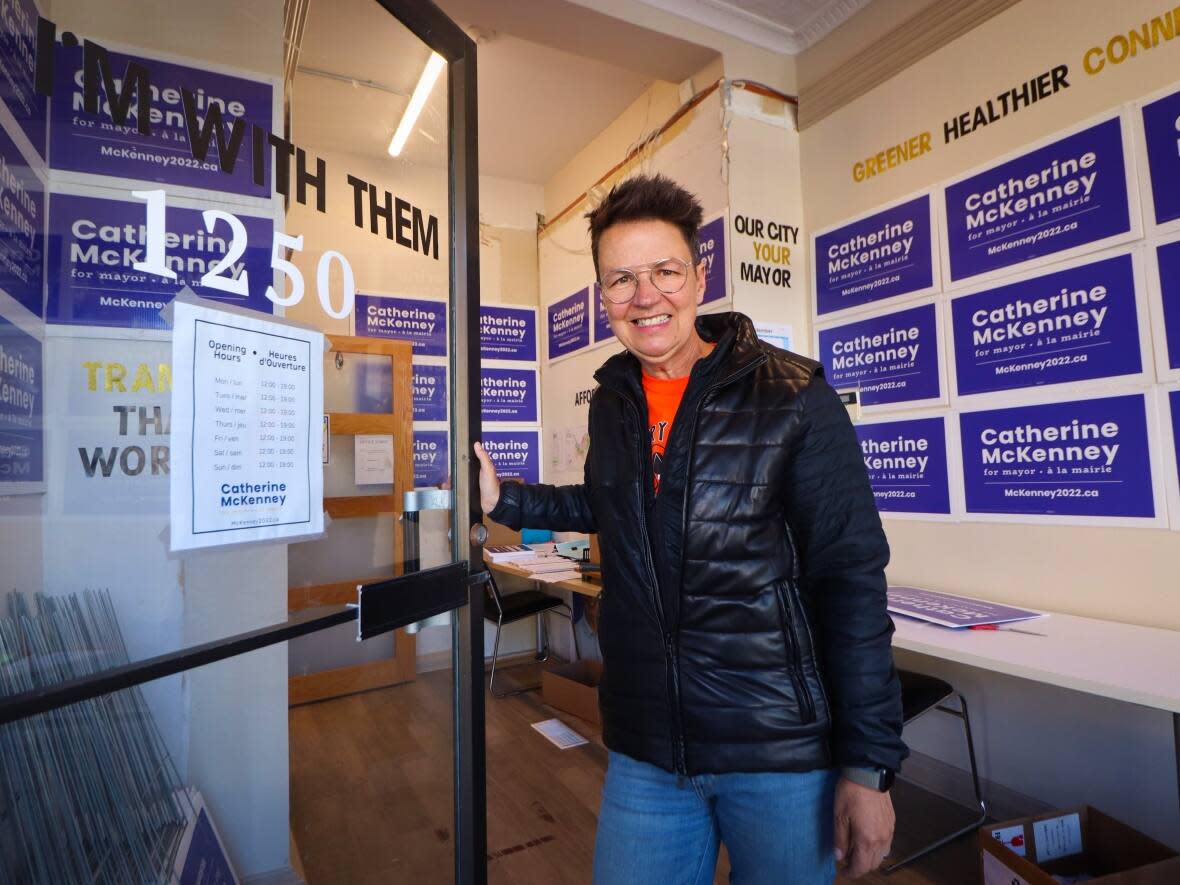
With less than two weeks until election day, CBC Ottawa is profiling several of the candidates vying to be the city's next mayor. Today: two-term city councillor Catherine McKenney.
It was a spur-of-the-moment decision, one that — thanks to a dying phone battery — almost didn't happen.
This winter, Catherine McKenney beamed into city council from part of the downtown that had been overtaken by demonstrators livid about COVID-19 mandates and the federal government.
The Somerset ward councillor wanted to make the raucous reality of the Freedom Convoy protests and their impact on downtown residents crystal clear to the rest of council.
"People just needed to see it. It really was a last-minute decision. I actually got accosted by someone when I was on tape," said McKenney, reflecting last month from the calmer confines of a Wellington West coffee shop near their campaign office.
It was a decision that also elevated McKenney's public profile beyond Ottawa as one of the faces of the resistance to the convoy, and one that may have helped vault them into the conversation as a contender to replace outgoing Mayor Jim Watson.
But at the time, McKenney's reasons were more basic.
"I hadn't given it much thought. I just was desperate. I couldn't have another weekend of it."
When you speak to McKenney's friends and colleagues, "desperate" isn't exactly a word that gets used to describe the 61-year-old grandmother, ultramarathon runner, two-term councillor and Ottawa mayoral candidate.
Instead, they say things like "grounded," "collaborative" and "competent." They cite McKenney's deep understanding of municipal bureaucracy, a result of several years spent in the deputy city manager's office.
And if some who spoke to CBC wonder whether McKenney might need to tone down their passionate advocacy in the mayor's chair (McKenney uses they/them pronouns and identifies as trans non-binary), they also laud their willingness to stand up for those beliefs while remaining realistic about what can be accomplished.
"They're very authentic. They are who they say they are," said Simone Thibault, who met McKenney three decades ago when the pair worked to get the names of murdered women and girls inscribed on a monument at Minto Park.
"Catherine is smart and aware and tuned in," wrote Kitchisippi Coun. Jeff Leiper, one of McKenney's frequent collaborators on city issues, in an email. "There aren't any elephants in the room when talking with Catherine. It's all on the table."
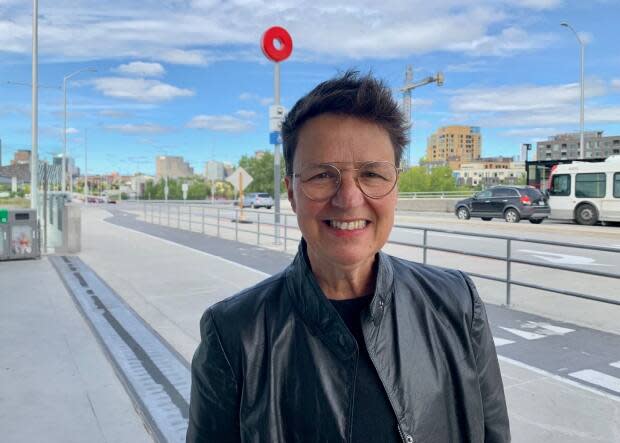
From small-town Quebec to the nation's capital
Born in Fort Coulonge, Que., into a family of loggers, McKenney came to Ontario as a teenager. They moved first to Pembroke, Ont., for high school — McKenney's father taught forestry there for Algonquin College — before arriving in the nation's capital to study political science at the University of Ottawa.
After graduating, McKenney got a job reading news articles verbatim on cable television for people who were blind or had other visual impairments.
By the late 1990s, they'd found their way into municipal politics, working for a pair of Ottawa city councillors: Alex Munter, currently the head of CHEO but then a councillor in suburban Kanata, and Diane Holmes, whom they'd later succeed as the representative for Somerset ward.
McKenney would work for Holmes in the morning and Munter in the afternoon. They'd ride the bus to city hall from Kanata, where for part of that time they lived at Lao Village, a housing co-op in the west-end suburb.
"I thought the world of both of them," recalled McKenney. "It really gave me an insight into the competing needs of suburban and urban neighbourhoods — but also the similarities."
McKenney left municipal politics in 2004 to serve as a legislative assistant for former federal NDP leader Ed Broadbent — at that time the MP for Ottawa Centre — and then his successor in the riding, Paul Dewar. But by 2008, they were back at city hall, working as a senior advisor to then-deputy city manager Steve Kanellakos.
While McKenney feels they were "pretty good" at the non-partisan job, it wasn't always easy to keep their own vision for the city to themselves.
"I could see that some of the decisions that council was making at the time, cuts to transit, cuts to recreation services, weren't being made in the best interests of people," McKenney said.
It was during that time that McKenney began seriously considering their own council run. And when Holmes announced she was retiring ahead of the 2014 election, McKenney put their name on the Somerset ward ballot — and handily bested the 11-candidate field with more than 40 per cent of the vote.
"Most people run for mayor, but they know nothing about the [inner workings of the] city," said Holmes, who's now helping with McKenney's election campaign.
"And it's unusual to have someone who understands the bureaucratic point of view and how that operates — and is knowledgeable about the public."
Fighting for the library and LRT
Over the next four years, McKenney worked to expand streetside patios and advocated for better cycling connections in the downtown. They fought unsuccessfully to build Ottawa's new central library in the city's traditional core, rather than at LeBreton Flats.
They were re-elected in 2018 — this time in a veritable landslide, raking in roughly three-quarters of the votes.
It would be a busy second term.
When the launch of Ottawa's LRT network descended into a cavalcade of shutdowns and derailments, McKenney — whose ward the light rail line cuts through — became the first councillor to propose a public inquiry to get to the bottom of everything. (An inquiry, called by the province and not council, wrapped up this summer, with a full report slated to be delivered to Ontario's transportation minister by the end of November.)
Then this January, the trucker convoy protesting mandates related to COVID-19 flooded into the nation's capital, parking their big rigs and trailers on the streets of McKenney's constituents and blasting their horns day and night.
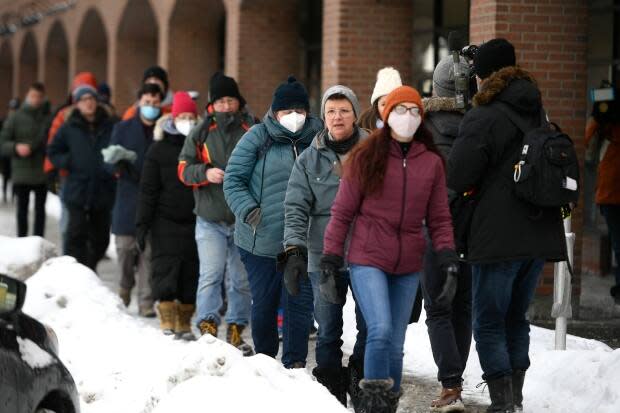
That first weekend, McKenney said, the situation was so tense that they didn't leave their home.
"I was genuinely afraid. And then I thought I had to do something," said McKenney, who just weeks earlier had declared their mayoral bid. "So I started to go down [to the protests]. I was always careful."
McKenney arranged communal walks through the downtown with residents who felt unsafe. They dealt with countless emails and phone calls from people complaining about noise, exhaust fumes and racist behaviour.
For Thibault, who'd retired just a few months earlier as head of the Centretown Community Health Centre, McKenney made a huge difference during the occupation by just being present and visible.
"They were always there," said Thibault. "They had our back. They understood what we were going through. They were with us on the street, paying attention and trying to make things better."
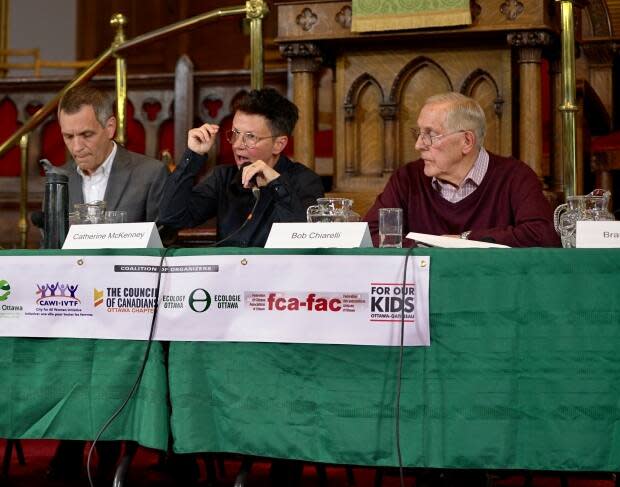
Coming out — twice
Of course, in the minds of many people, McKenney's two terms around the council table — and now, their bid for mayor — is as notable for what they accomplished as for who they are.
When McKenney was elected eight years ago, they became the first non-male openly LGBT councillor in Ottawa's history. Then early in their second term, they tweeted that they also identified as trans non-binary.
McKenney says they've identified that way for years, and it was only in 2019 — amidst a "real uptick in transphobia everywhere" — that they decided it was important to state so publicly.
"It went a bit viral! It surprised me. I guess it was kind of my second coming out, without me realizing it," they said.
"It doesn't feel comfortable identifying as 'she' or 'he.' So 'they' and 'them' feels comfortable. But also I know there are a lot [of people] who struggle with it every day, who may feel uncomfortable coming out at work. And when you have a public platform the way I do, I think you have to use it sometimes for public good."
More than three decades earlier, McKenney lived through their first coming out as a young gay person in their 20s. McKenney was at university, and while they weren't intimately connected with the local LGBT scene, they did have a few friends they could bond with.
"It was exciting! I mean, it was frightening at the time, too. I experienced a lot of homophobia," McKenney said.
"I always say, you know, the first time I marched in Pride, there might have been 200 of us — and nobody was out cheering."
Today, McKenney lives with their wife of 17 years, also named Catharine, and their menagerie of pets: two dogs, two cats, and one rat. (The larger animals are all rescues, McKenney notes. The rat, not so much.) Even during a hectic mayoral campaign, they try to wind down together with some television at the end of the day; McKenney says their latest obsession has been Dopesick, the acclaimed miniseries about the U.S. opioid crisis.
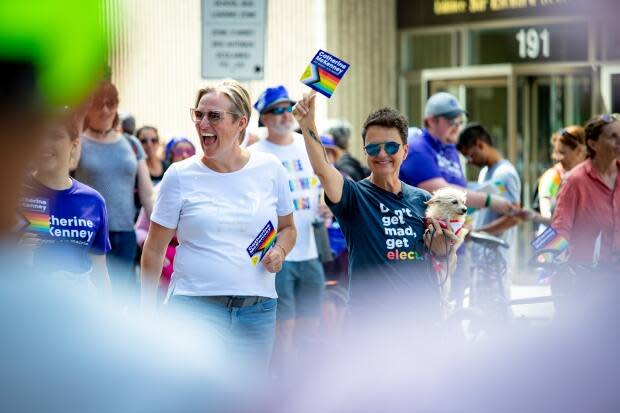
If McKenney does win on Oct. 24, they'll become Ottawa's second consecutive openly LGBT mayor — Watson came out as gay in 2019 after 40 years of keeping his sexual orientation private — and the first openly trans non-binary mayor of a major Canadian city.
McKenney says they're trying to stay focused on their platform, which includes promises like freezing transit fares, ending chronic homelessness, holding annual property tax hikes to three per cent, and working to make the Greenbelt a national park.
Making history in that way doesn't preoccupy their thoughts — though it can't help but break through from time to time.
"Every so often, I think, wow, if I'm fortunate enough to be elected, I think it'll be a good thing! It'd be pretty cool!" said McKenney, a few minutes before dashing off to another interview.
"But yeah, I don't [dwell on] it. I only think about the campaign."


